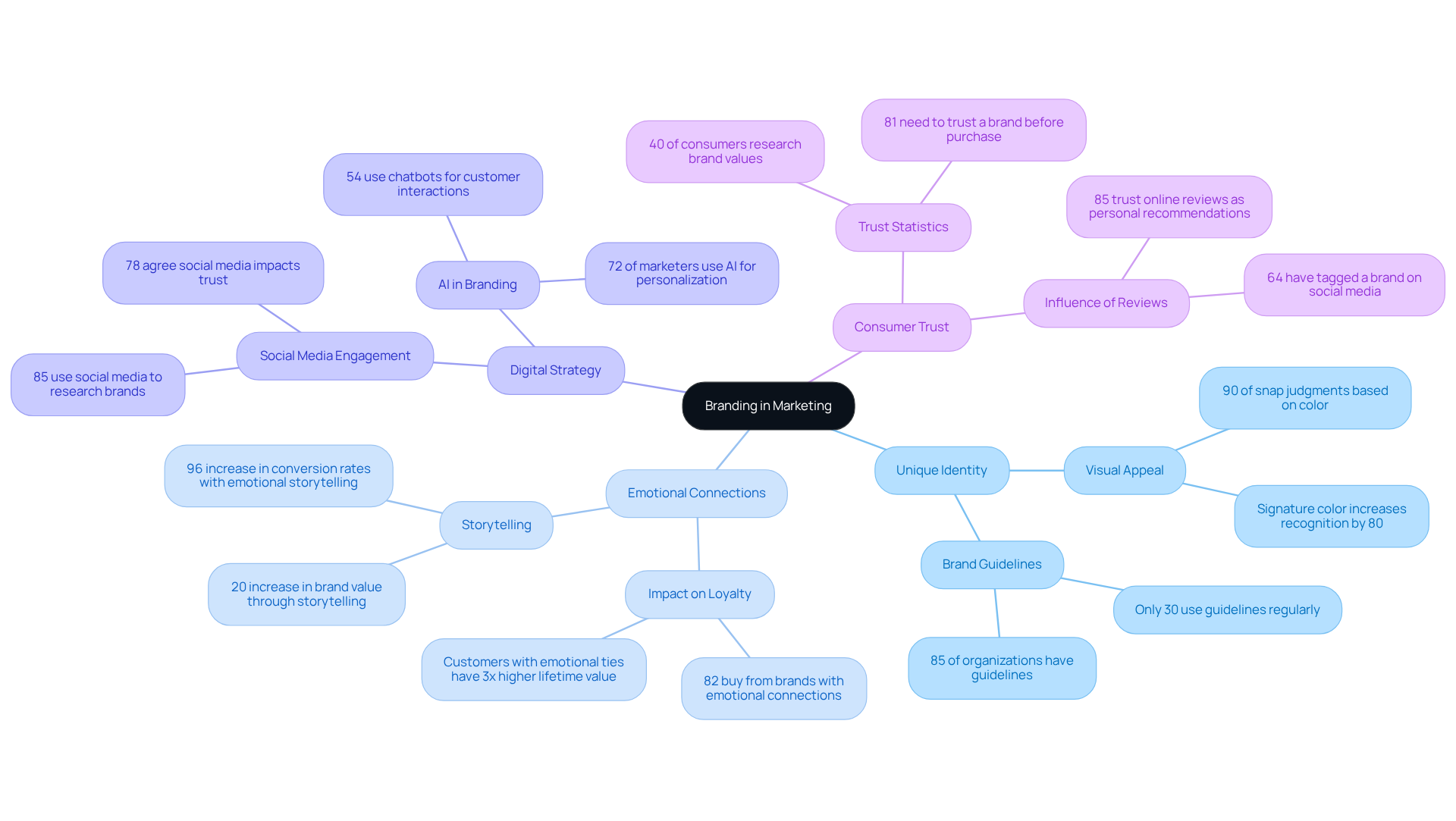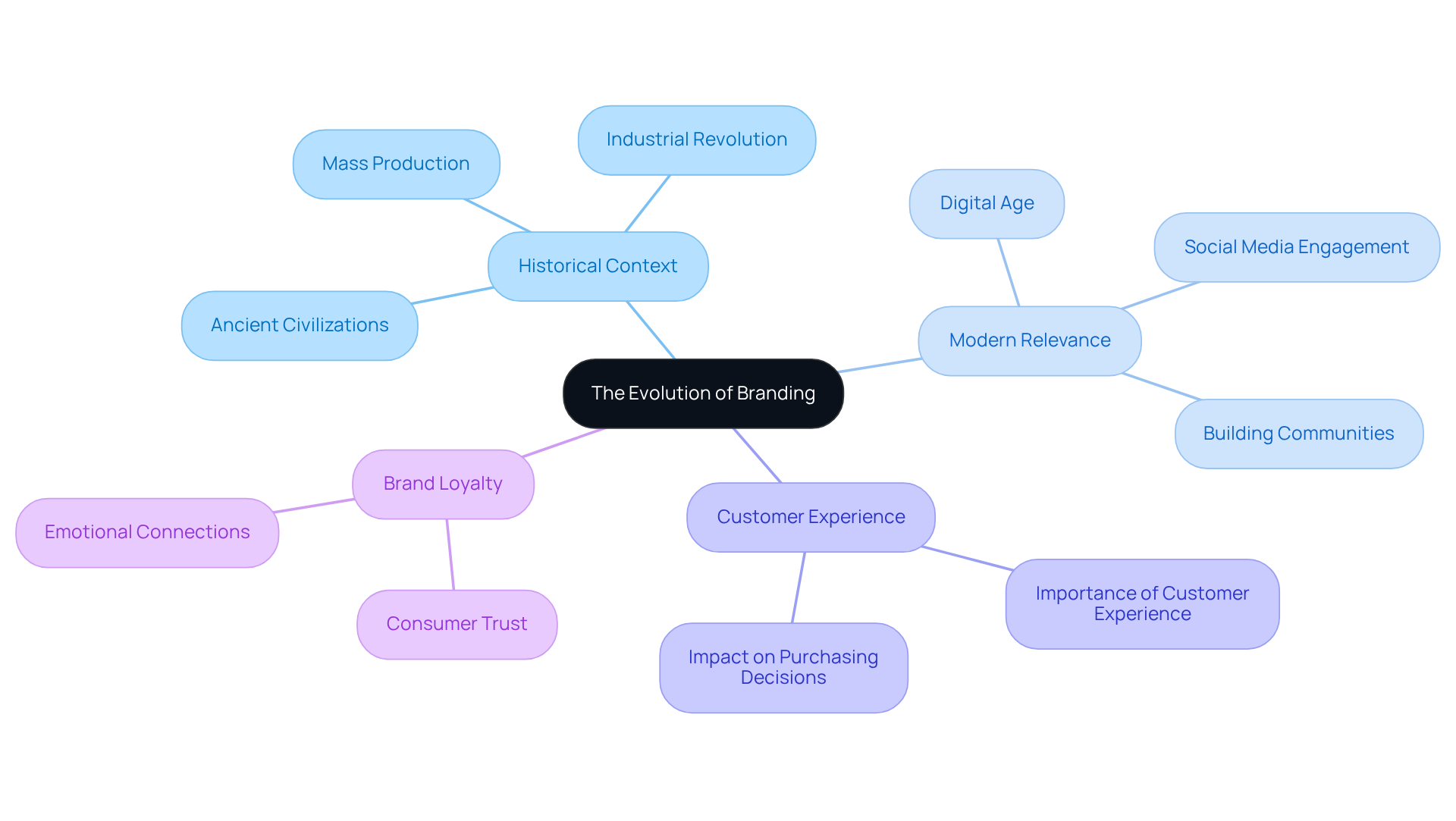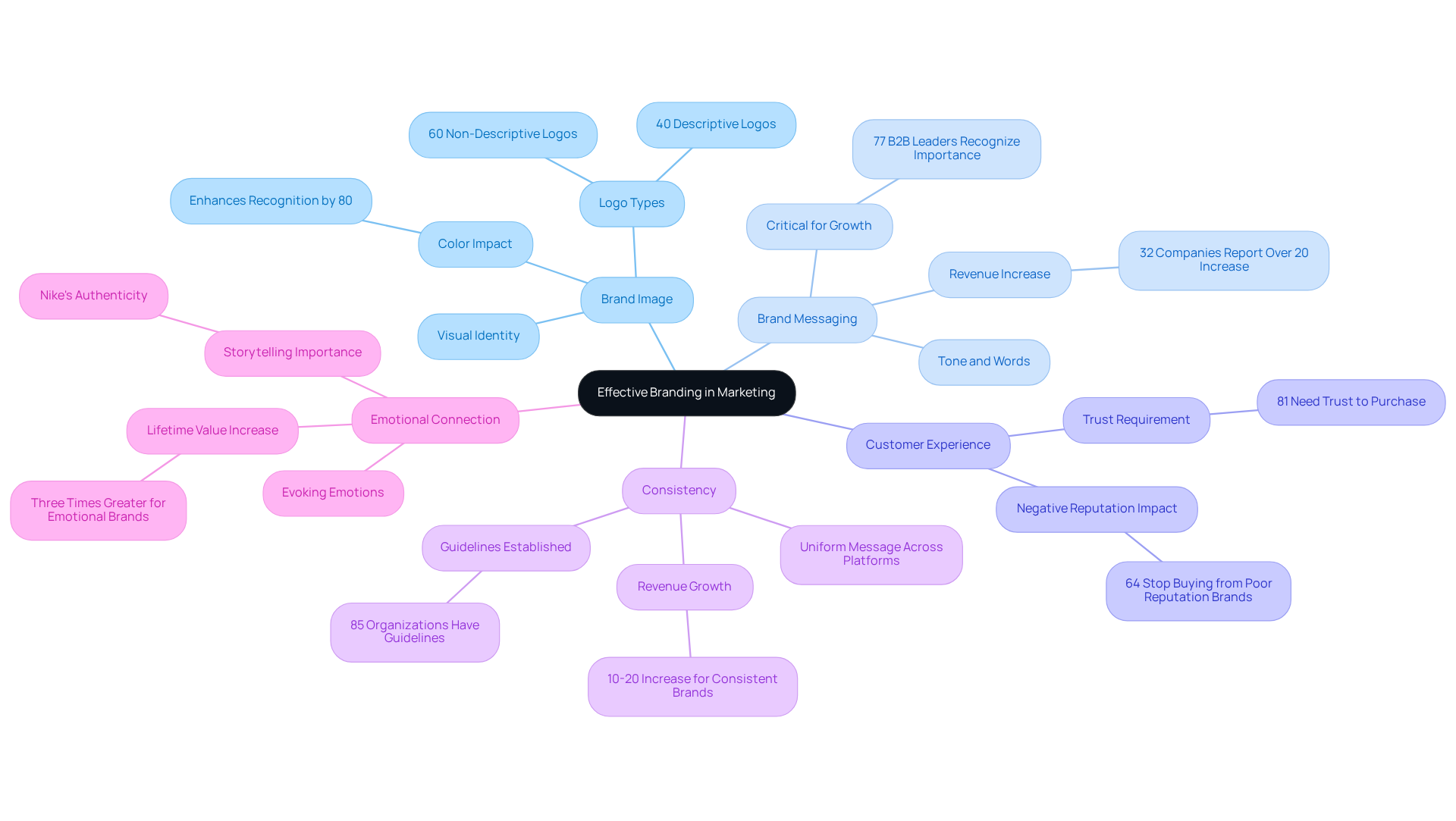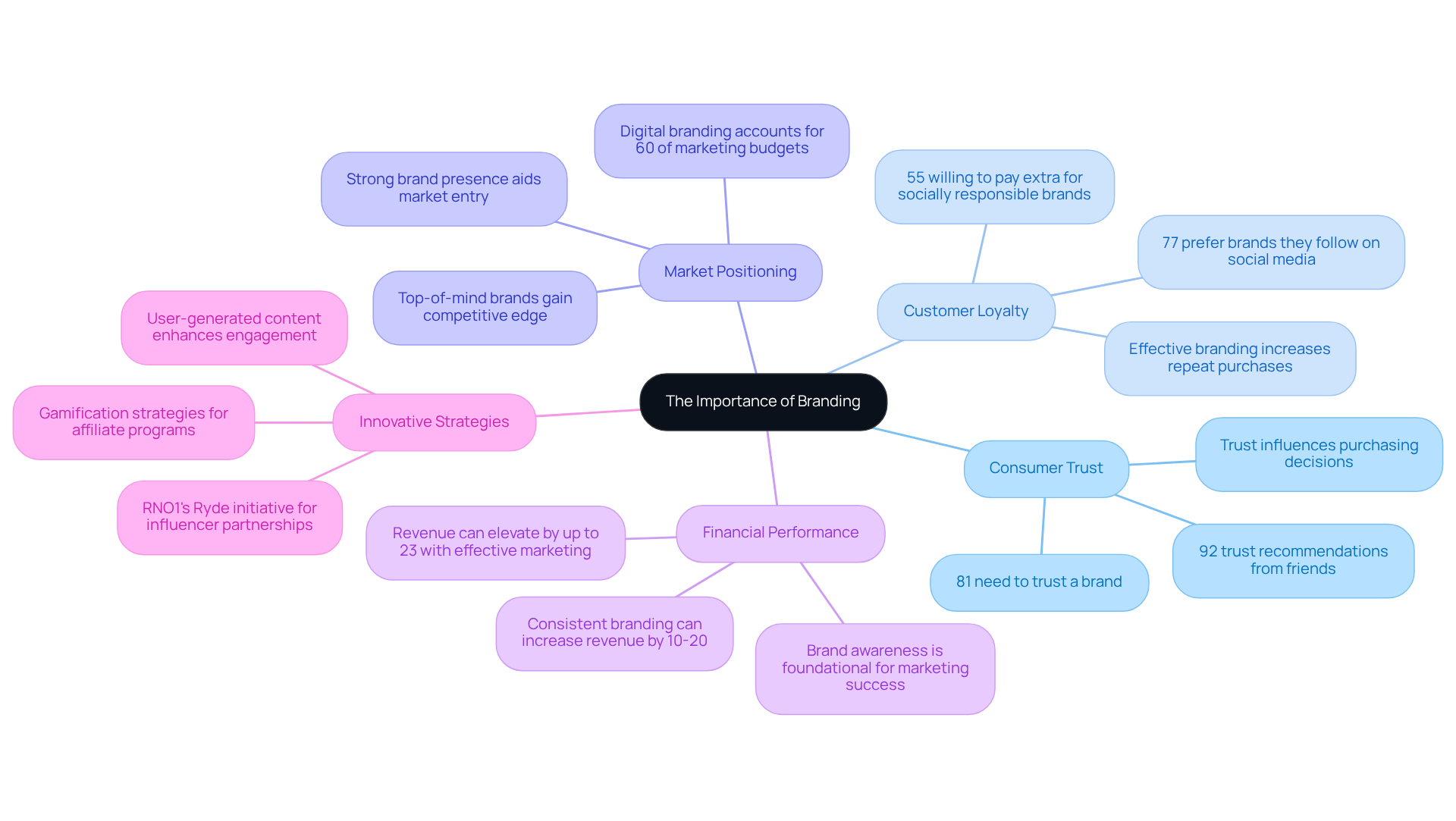Overview
Branding in marketing often presents a challenge for many businesses: how to create a unique identity that resonates with consumers. This process is not just about logos or slogans; it’s about shaping perceptions and building emotional connections that influence purchasing decisions. It can feel overwhelming, especially in a crowded marketplace where standing out is crucial. However, effective branding can foster trust and loyalty, which are essential for success.
Key elements of effective branding include:
- Brand image
- Messaging
- Customer experience
- Emotional engagement
Each of these components plays a vital role in enhancing the connection between a brand and its audience. When consumers feel a sense of trust, they are more likely to remain loyal, driving business success in even the most competitive landscapes.
At RNO1, we understand these challenges and are here to support you. Our approach focuses on nurturing your brand’s identity while addressing the emotional needs of your audience. By sharing personal stories and insights from industry leaders, we create a community where you can feel empowered to share your experiences and connect with others. Together, we can navigate the complexities of branding and build a strong foundation for your business.
Introduction
Branding in marketing is more than just logos and slogans; it embodies how consumers truly perceive and engage with a brand. In today’s competitive landscape, it’s vital for businesses to grasp the complex dynamics of branding. This understanding is key to building trust and loyalty among consumers.
However, as consumer expectations shift and digital transformation accelerates, brands face the challenge of connecting meaningfully with their audience. How can they stand out in such a crowded marketplace? This exploration not only defines branding but also examines its evolution and essential elements.
Together, we’ll uncover strategies that can transform a simple product into a cherished brand, fostering deeper connections and lasting loyalty.
Defining Branding in Marketing
What is branding in marketing is not just about creating a unique identity for a product or service through names, symbols, designs, and messaging; it’s about shaping the perceptions and experiences of individuals. This persona significantly influences how people view a company, often rooted in their personal interactions. Effective marketing does more than set a company apart from its competitors; it builds emotional connections that foster customer loyalty. In today’s digital landscape, branding transcends mere visual identity, embracing the strategic use of digital platforms to convey values and connect with audiences on a deeper level.
At RNO1, we understand the challenges businesses face in cultivating a resilient and innovative identity. Our design-centered approach ensures that every interaction with our brand leaves a lasting impression, nurturing stronger relationships with customers. Consider this: about 81% of shoppers need to trust a product before making a purchase, and companies that forge emotional connections can see a staggering 96% increase in conversion rates. Moreover, over half of consumers are willing to pay more for brands that align with their values, underscoring the importance of authenticity in today’s marketing landscape.
Real-world examples of successful digital marketing illustrate these principles beautifully. Companies that harness user-generated content and emotional storytelling not only bolster their credibility but also significantly sway purchasing decisions. For instance, those who consistently share their narrative can experience a 20% increase in perceived value, highlighting the profound impact of storytelling in fostering loyalty.
As we approach 2025, understanding what is branding in marketing will become increasingly important for brand recognition. With over 75% of global enterprises expected to prioritize branding strategies over infrastructure, the focus will shift toward creating meaningful connections with consumers. In this evolving landscape, companies that maintain consistency across all touchpoints and engage genuinely with their audience will be best positioned to thrive. This is especially true for those who embrace innovative marketing and digital solutions, like those offered by RNO1, which can guide you on this transformative journey.

The Evolution of Branding: Historical Context and Modern Relevance
Branding has deep roots in ancient civilizations, where artisans marked their goods to signify ownership and quality. This practice laid the foundation for understanding what is branding in marketing, which evolved into complex brand identities that reflect values, missions, and customer experiences. Yet, in today's crowded marketplace, many businesses struggle to stand out. The industrial revolution marked a pivotal moment in marketing history; as mass production surged, establishing a distinct identity became essential for differentiating products. It's concerning to note that 73% of shoppers view customer experience as crucial in their buying decisions, underscoring the importance of brand identity in fostering positive interactions.
In our digital age, the creation of identity has transformed into a dynamic process. Social media and online platforms now enable companies to engage directly with customers. This shift highlights a common challenge: identity must now go beyond mere recognition; it should focus on building connections and nurturing communities around a brand. Consider this: 90% of buyers believe brand loyalty is vital to their purchasing choices, emphasizing the need for brands to authentically engage with their audience. As we approach 2025, what is branding in marketing is increasingly important, as the evolution of brand identity continues to reflect changing consumer expectations and technological advancements, making it an essential aspect of modern marketing strategies. Together, we can navigate these challenges and foster meaningful connections that resonate with our audience.

Key Elements of Effective Branding in Marketing
Effective branding in marketing encompasses several essential elements that can truly make a difference for your startup:
-
Brand Image: Imagine your brand as a visual identity that resonates with your audience. This includes logos, colors, and typography, which together create a recognizable appearance. Research shows that color can enhance product recognition by up to 80%, underscoring its importance in your branding journey. It’s worth noting that 60% of companies opt for non-descriptive logos, highlighting the challenge of standing out in a crowded market. Your brand image is not just a visual; it’s your first impression.
-
Brand Messaging: The words you choose and the tone you adopt in your communications are vital for expressing your brand's values and personality. Consistent messaging is more than a best practice; it can lead to significant results. In fact, 32% of companies report a revenue increase of over 20% due to consistent messaging. Moreover, 77% of B2B marketing leaders recognize what is branding in marketing as critical for growth. This illustrates how vital it is to communicate clearly and consistently.
-
Customer Experience: Every interaction shapes how your customers perceive and connect with your brand. A staggering 81% of buyers need to trust a brand before considering a purchase, while 64% of shoppers have stopped buying from brands with negative reputations. This highlights what is branding in marketing and its broader implications on consumer behavior, along with the necessity of fostering a positive customer experience. Your customers' trust is essential.
-
Consistency: Maintaining a uniform message and visual identity across all platforms is crucial for building trust with your audience. Organizations that prioritize consistency can see revenue growth of 10-20%. Additionally, 85% of organizations have established guidelines to enhance consistency, indicating a widespread recognition of its importance. Consistency is key to nurturing long-term relationships.
-
Emotional Connection: Successful brands often evoke emotions that resonate deeply with their target audience, fostering loyalty and advocacy. Brands that create emotional ties with their customers can achieve three times greater lifetime value. This illustrates the power of storytelling and emotional engagement in branding. As Nike emphasizes, staying true to your brand’s essence is vital for earning public trust and loyalty. Your brand’s story can be a powerful tool in connecting with your audience.
In conclusion, effective branding is not just about aesthetics; it’s about building meaningful relationships with your customers. By focusing on these essential elements, you can create a brand that not only stands out but also resonates with your audience on a deeper level.

The Importance of Branding: Influence on Consumer Behavior and Business Success
Understanding what is branding in marketing is vital for shaping buyer behavior and fostering business success. Many entrepreneurs face the challenge of establishing trust with consumers, as 81% of shoppers indicate that they need to trust a brand before making a purchase. This trust can lead to a willingness to pay more for products from reputable companies.
Take, for instance, Apple and Nike; they have built strong identities that not only attract customers but also cultivate communities of loyal supporters. When branding is effective, it enhances customer loyalty, encouraging repeat purchases and valuable word-of-mouth referrals. In fact, 77% of shoppers prefer to buy from brands they follow on social media, highlighting the importance of brand engagement in driving sales. Additionally, 64% of consumers are prompted to make a purchase after watching a branded social video, showcasing the power of social media in influencing buying decisions.
Furthermore, branding significantly impacts market positioning, aiding in the entry into new markets and the introduction of new products. In a competitive environment, a well-defined identity becomes a crucial differentiator, paving the way for long-term success.
RNO1's Ryde initiative is a testament to innovative strategies that scale omnichannel ambassador programs and enhance e-commerce engagement through influencer partnerships. By curating and executing national user-generated content programs, developing sales funnel sequences, and implementing gamification strategies for affiliate programs, RNO1 effectively supports the growth and scalability of influencer and ambassador programs globally.
Consistent marketing can elevate revenue by up to 23%, and a uniform presentation across platforms can boost revenue by 10-20%, underscoring the direct link between branding and financial performance. As businesses shift their focus towards brand strategies, it becomes increasingly clear what is branding in marketing and its profound impact on pricing and overall market presence. Together, we can navigate these challenges and unlock the potential of your brand.

Conclusion
Branding in marketing is more than just logos and slogans; it is about the entire experience a consumer has with a brand. Many businesses struggle to establish a unique identity that truly resonates, leading to a disconnect with their audience. This disconnect can hinder emotional connections, shaping perceptions and influencing purchasing behavior in ways that may not be favorable. As the digital landscape evolves, the importance of branding in building trust and loyalty becomes even more critical. For businesses aiming to thrive in a competitive marketplace, understanding this is essential.
This article highlights key elements that contribute to effective branding:
- Brand image
- Messaging
- Customer experience
- Consistency
- Emotional connection
Each element plays a vital role in crafting a strong brand identity that speaks to consumers. The statistics presented reveal the undeniable importance of authenticity and engagement, showcasing how a thoughtful brand strategy can foster trust, loyalty, and ultimately, business success.
As the branding landscape continues to shift, businesses must adapt and innovate. Embracing effective branding strategies not only enhances market positioning but also nurtures consumer engagement and satisfaction. By prioritizing meaningful connections and authentic storytelling, brands can unlock their full potential, navigating the challenges of an ever-changing market. Investing in branding today is not merely about standing out; it is about cultivating relationships that ensure long-term success and relevance in the years to come. Together, let us embrace the journey of branding, fostering connections that truly matter.
Frequently Asked Questions
What is branding in marketing?
Branding in marketing involves creating a unique identity for a product or service through names, symbols, designs, and messaging, while also shaping perceptions and experiences of individuals. It aims to build emotional connections that foster customer loyalty.
Why is emotional connection important in branding?
Emotional connections are crucial because they significantly influence how people view a company. Companies that forge these connections can see a substantial increase in conversion rates and customer loyalty.
How does branding go beyond visual identity?
Branding transcends mere visual identity by strategically using digital platforms to convey values and connect with audiences on a deeper level, enhancing overall brand experience.
What evidence supports the importance of trust in branding?
About 81% of shoppers need to trust a product before making a purchase, and companies that create emotional connections can experience a 96% increase in conversion rates.
How do consumer values impact purchasing decisions?
Over half of consumers are willing to pay more for brands that align with their values, highlighting the significance of authenticity in marketing.
What role does storytelling play in branding?
Storytelling helps bolster credibility and sway purchasing decisions. Companies that share their narratives consistently can experience a 20% increase in perceived value.
What trends are expected in branding strategies by 2025?
By 2025, over 75% of global enterprises are expected to prioritize branding strategies over infrastructure, focusing on creating meaningful connections with consumers.
What should companies do to thrive in the evolving branding landscape?
Companies should maintain consistency across all touchpoints and engage genuinely with their audience, while embracing innovative marketing and digital solutions.




